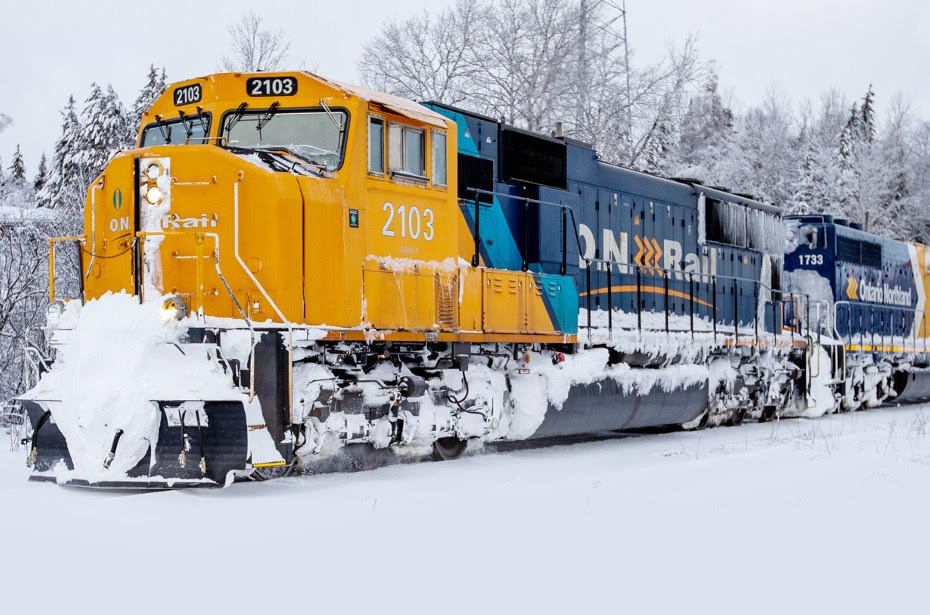MATHESON – A century-old train station is being demolished in 2025.
The Matheson train station, a historic building constructed in 1916, is set to be demolished early in the new year as part of Ontario Northland Railway’s (ONR) commitment to bringing back the northlander passenger rail service.
The station located at 385 Railway St. will be replaced by a modern transit shelter.
Mayor Dave Dyment said the demolition of the building is slated to take place in January or February, with construction of the new shelter happening in early spring.
The decision comes after a building condition assessment completed by the ONR that determined the structure was no longer suitable for use or renovation. In its place, the new shelter will include seating, heating and ample lighting.
Passenger rail service to the north ended in 2012. Returning the service to the rails has been talked about for years.
In 2018, Premier Doug Ford made a campaign promise to restore passenger rail service and the project has been slowly chugging along since.
The plan is for a train between Toronto and Timmins, with rail service also going to Cochrane, which would connect people with the Polar Bear Express that goes to Moosonee on the James Bay coast.
SEE: Northlander train design revealed, new construction contract awarded
Earlier this year, three contracts were awarded for designing and manufacturing nine station shelters, track improvements, and warning system upgrades. The new trainsets are expected to be delivered in 2026.
Once reinstated, the Northlander passenger rail service will operate four to seven days a week, based on seasonal travel demands.
The new Matheson shelter, said Dyment, reflects changes in how passengers interact with the rail service. Unlike the historical station, the shelter will cater specifically to passenger needs in a digital age, without facilities for cargo or ticket kiosks.
“This is a passenger train only,” he said.
“Everything is going to be online for the new train. You’ll buy your ticket online, scan it on your phone, and board the train. There’s no need for a traditional station.”
Dyment hopes the ONR will take steps to clarify the new system to residents, as some are still confused about how it will work.
“There’s been no explanation, really, of how the ticket sales will work. So, I think that piece is missing. Hopefully we can get that clarified for residents,” he said.
Balancing heritage and progress
The planned demolition has sparked mixed reactions within the community, with some residents disappointed over the loss of the historic structure.
“Myself, I have more of a personal connection to the train, because my father was the president of the ONR. He worked at the ONR for about 40 years and was the president for about 10 years,” he said.
“So, I know quite a bit about the Northland. I know quite a bit about the entire operation. So, yeah, I have an emotional attachment too.”
However, Dyment said “people have to realize things change,” and he sees the practical challenges of maintaining aging infrastructure.
“As I told a resident the other day, imagine if somebody decided that your house was heritage and you were forced to keep it forever, even if you don’t want to. And when you pass it on to your kids or grandkids, they have to keep it. They have to maintain it, pay taxes on it, even if they don't want to, just because someone said we think it's a part of our heritage. That’s where my personal feeling is on that,” he said.
“I know people will be frustrated, but at least we have a train. That’s a positive thing.”
Dyment suggested ways to commemorate the station without keeping the building.
“Maybe we could adorn the shelter with some pictures. Maybe we could build some sort of monument with a couple of bricks and pictures of what used to be here,” he said.
He also floated the idea of offering residents mementos, such as bricks or pews from the station, similar to how the Toronto Maple Leafs auctioned seats from their old arena.
Dyment emphasized the importance of focusing on progress rather than opposition.
“If you have 3,000 people and 20 of them are against it, we have to decide where our efforts are going to be pushed,” he said.
“Do we want to push towards something positive or a Facebook cause at this point?”
Looking ahead, Dyment said he believes the community should focus on the benefits of the returning Northlander service, even as they grapple with the loss of a beloved local landmark.
“At least they’re telling us what they’re doing, which is nice,” he said.
